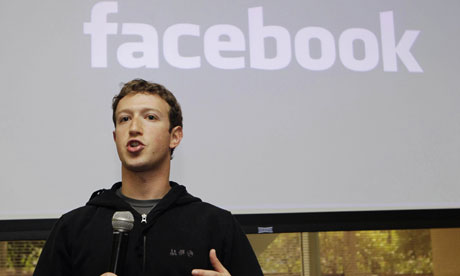
The number to watch is not the putative $100bn valuation but the 845 million users that Facebook now claims to have. The observation that if Facebook were a country then it would be the third most populous on the planet has become a cliche, but underpinning it is an intriguing question: how did an idea cooked up in a Harvard dorm become so powerful?
Thanks to a compelling movie, The Social Network, we think we know the story. A ferociously gifted Harvard sophomore named Zuckerberg has difficulties with women and vents his frustration by creating an offensive web application that invites users to compare pairs of female students and indicate which is "hottest". He puts this up on the Harvard network where it gets him into trouble with the authorities. Then he lifts an idea from a pair of nice-but-dim Wasp contemporaries who need a programmer and, in a frenzied burst of inspired hacking, implements the idea in computer code, thereby creating an online version of the printed "facebooks" common to elite US universities. This he then launches on an unsuspecting world. The Wasps sue him but lose (though get a settlement). Zuckerberg goes on to become Master of the Universe. Cue music, fade to black.
It's all true, sort of, but the dramatic imperatives of the narrative obscure the really significant bit of the story. So let's rewind. Zuckerberg creates his noxious application, called "Facemash", which appears to be modelled on hotornot.com – and uploads it to the servers on Harvard's internal network. In no time at all there is such a hoo-ha that he has to take it down. (In the film the Harvard authorities take it down, but that's a detail). Zuckerberg is hauled over the coals by the university authorities and labelled a bad boy. Facemash is history.
Next time, though, when The Facebook (as the service was originally called) is ready to go, Zuckerberg doesn't put it on the internal network. Instead, with $1,000 borrowed from a friend he buys space on a hosting service and puts it on the internet. As with Facemash, The Facebook goes viral within Harvard. But this time there's nobody who can shut it down. The bird has flown, and Zuck is on his way to his first billion.
This subtext isn't highlighted in the film, of course, but it's the most significant thing in it, because it explains why the internet is such a disruptive force — and why it's so important for our futures. "What is important in Zuckerberg's story," wrote the Harvard professor Lawrence Lessig in his review of the film, "is not that he's a boy genius. He plainly is, but many are. It's not that he's a socially clumsy (relative to the Harvard elite) boy genius. Every one of them is. And it's not that he invented an amazing product through hard work and insight that millions love. The history of American entrepreneurism is just that history, told with different technologies at different times and places.
What's important here is that Zuckerberg's genius could be embraced by half a billion people within six years of its first being launched, without (and here is the critical bit) asking permission of anyone. The real story is not the invention. It is the platform that makes the invention sing. Zuckerberg didn't invent that platform. He was a hacker (a term of praise) who built for it. And as much as Zuckerberg deserves endless respect from every decent soul for his success, the real hero in this story doesn't even get a credit."
Lessig's right: the really significant thing about the internet is that it's an enabler of "permissionless innovation". And this is no accident: it's a consequence of the way the network was designed. Way back in the 1970s, when Vint Cerf and Bob Kahn were pondering the problem of how to create the internet, they came up with two basic principles: there should be no central ownership or control; and the network should be indifferent to the uses to which it was put. If you had an idea and it could be realised by shipping data across the internet, then the network would do it for you, no questions asked.
Because software is pure "thought stuff" all you need is imagination and programming talent. And you don't need much money, which explains why many of the dominant internet enterprises did not require major investment at the beginning. Tim Berners-Lee launched the web with no funding. Jeff Bezos started Amazon with his savings. Pierre Omidyar did the same with eBay. Shawn Fanning was penniless when he launched Napster, the orginal file-sharing service. Zuckerberg launched Facebook with $1,000 – borrowed from friend Eduardo Saverin.
Facebook is just the latest demonstration of how permissionless innovation is embedded in the internet. For the network, disruption is – as programmers say – "a feature, not a bug": it's what the network was designed to do. That's why established industries and authority structures fear it so much. And it's why we need to make sure that they don't wreck it with clueless regulation.

